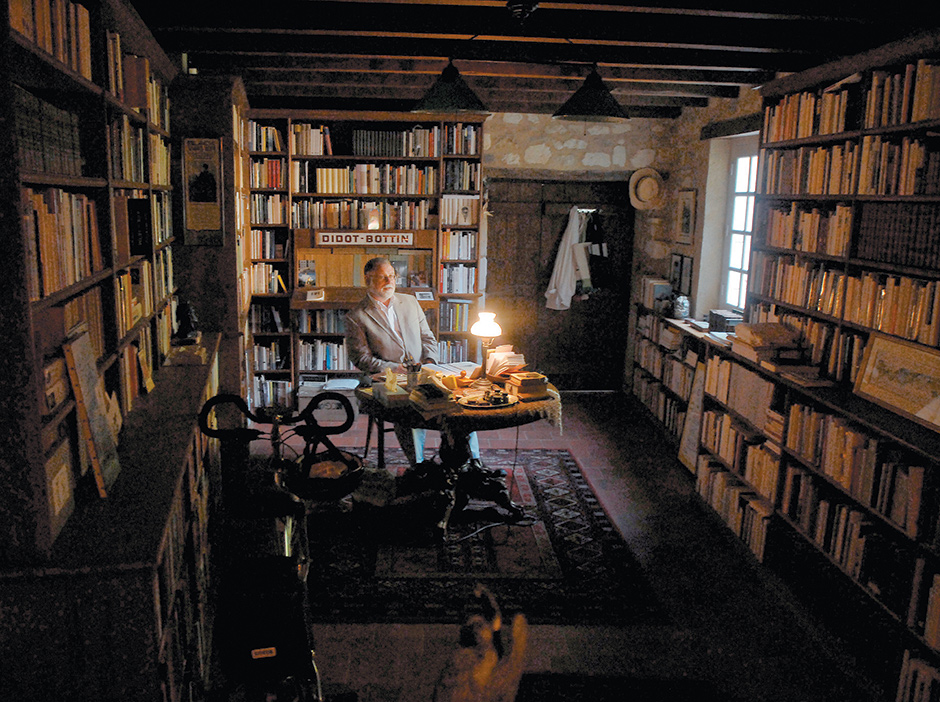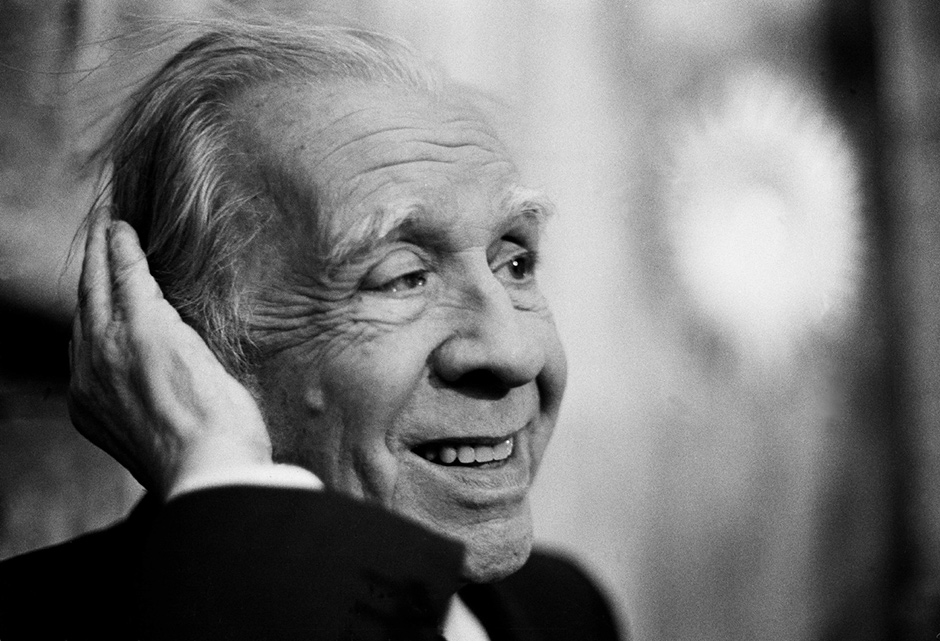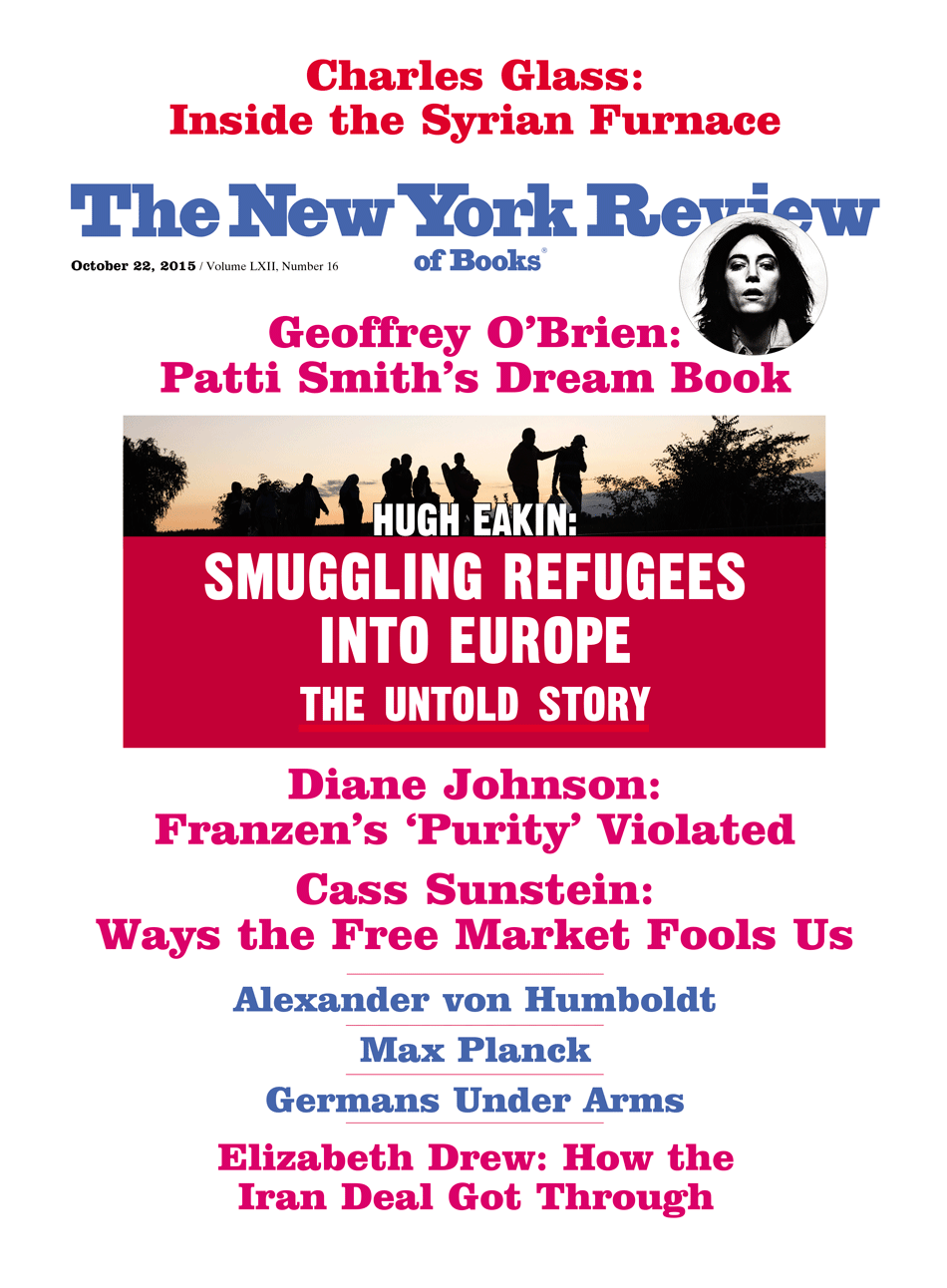When he was sixteen Alberto Manguel met the nearly blind Jorge Luis Borges in the Pygmalion Anglo-German bookshop in Buenos Aires and, from 1964 to 1968, read aloud to him on a weekly basis. The encounter now seems to have been destined, for if there’s anyone alive today who is as widely read and bibliomaniacal as Borges was in his day, it’s the author of Curiosity, the latest in a series of Manguel’s meditations about reading, libraries, and the spectral spaces in the human psyche that literary works occupy.
Books have defined Manguel’s life. Though he was born in Buenos Aires, he spent his first seven years in Israel, where his father served as the Argentinian ambassador, before returning to Argentina after the fall of Juan Perón in 1955. Raised by a Czech nanny, with whom he spoke German, Manguel could not communicate with his Spanish- speaking parents until after the family returned to Argentina. (“I spent no time with my parents,” he recalled in a recent interview. “I said good morning to them some mornings. That’s all I can remember.”) In his youth he became an obsessive reader, and early on books became a kind of homeland for him.
Thus, after residing in Paris, London, and Tahiti in the 1970s, and then moving to Toronto in 1982, Manguel left Canada in 2000 (retaining his Canadian citizenship), for no other reason than to find a spacious enough place to house his personal library of over 30,000 volumes. That library now fills a restored medieval presbytery near Châtellerault, in the southwest of France, where Manguel, when he is not traveling, lives with his extended family of books.
More than a mere collection, Manguel’s library represents the material and spatial extension of his readerly mind; he conveys a sense that posthumous voices and literary characters converse among themselves under his roof. “This transmigration of souls,” we read in Curiosity, “is literature’s modest miracle.” In the eighth chapter, Manguel recalls a priest of Basque origin whom he interviewed in his early twenties for a Buenos Aires newspaper. The priest had moved to Argentina in the 1930s and had a passion for beekeeping. He would speak to his bees in Basque in a gentle voice that contrasted sharply with the vehement tones and gestures with which he spoke Spanish:
It was he who told me that when a beekeeper dies, someone must go and tell the bees that their keeper is dead. Since then I’ve wished that when I die someone will do the same for me, and tell my books that I will not come back.
It is this devotion to books, and his ability to bring them alive in his own gentle beekeeper’s voice, that have endeared Manguel to his many admirers in America and abroad, making him a favorite on the international literary lecture circuits. Like many of the other publications that established his worldwide reputation as a man of letters—A History of Reading, A Reader on Reading, The Library at Night, A Reading Diary, among others—his newest publication shares with its reader the conversation Manguel holds with his books inside his own head.
Curiosity, with its vague, indeterminate title, refers to a staggering number of writers, religious traditions, artworks, manuscript histories, and various learned commentaries, like Maimonides’s twelfth-century Laws for the Study of the Torah, the early-seventeenth-century Inca Garcilaso’s Comentarios reales (a detailed account of the language, government, religion, and customs of the Incas), and Sansevero’s early-eighteenth-century “Universal Dictionary of the Art of War,” left unfinished at the letter O. One gets a sense of what kind of book Manguel has written from the twelve dense pages of its index, which begins with Abelard and ends with Zoroastrianism.
Many of the authors Manguel has written about extensively in the past—Montaigne, Lewis Carroll, Borges, Kafka, Saint Augustine, Aristotle, Plato—return here as major interlocutors. Others are more recent adoptions, preeminent among them Dante, whose Divine Comedy serves as the main point of reference in the book. Manguel came to Dante late in his life, when he was almost sixty, but he made up for lost time by mastering the essentials of the Commedia in less than a decade, which is no easy feat. Like so many readers before him, he has fallen hard for the Italian poet, finding in the Commedia what he wants to find—a dog at Dante’s feet as he wrote it, for instance—whether it’s there in the poem or not (the dog certainly is not).1
Curiosity offers neither a history nor a philosophy of curiosity but something like a “cartography” of the author’s imagination as he roams around in his library, evoking a great many of the voices that resound within it. A sentence in the book’s introduction could be taken as self-referential: “In following a necessarily eclectic path through a few of the questions sparked by our curiosity, something like a parallel cartography of our imagination may perhaps become apparent.” What becomes apparent here is that Manguel has a comprehensive and synthetic imagination that revels in promiscuous juxtaposition and the blurring of boundaries between authors, genres, eras, and traditions.
Advertisement
“What Is Language?” “Where Is Our Place?” “How Do We Reason?” “What Can We Possess?” “Why Do Things Happen?” “What Is True?” These are some of the seventeen chapter titles, each of which poses a broad question intended to arouse curiosity. Manguel makes a point of beginning every chapter with a couple of pages that recount a relevant anecdote from his own experience. This gives Curiosity a distinctly personal touch, adding a dimension of memoir to it, while at the same time making it clear that the author’s idiosyncratic selfhood is what ultimately holds this book together.
Certainly the central concept of curiosity is too loosely defined to hold the book together and Manguel feels free to bring together a variety of thoughts under its title. Consider the following passage from Maimonides’s Laws for the Study of the Torah:
The time for study [of the Torah] is divided into three parts: one third for the written Torah, one third for the oral Torah, and the last for reflection, drawing conclusions from certain premises, deducing one meaning from another, comparing one thing to another, judging the rules by which the Torah must be studied, until one reaches the knowledge that the Torah is the foundation of the rules, thus learning to understand what is forbidden and what is permitted in that which is learned through hearing. This then is what is called the Talmud.
Now consider Manguel’s commentary:
For Maimonides, a scholar who becomes wise need no longer dedicate himself to reading the written Torah (the words of the prophets) or to listening to the oral ones (the learned commentaries) but can devote himself exclusively to studying “according to the measure of his mind and the maturity of his intellect,” pursuing his curiosity.
The third part of study, succinctly summarized by Maimonides in its modes of procedure, requires the most rigorous and single-minded focus on the goal of “reach[ing] the knowledge that the Torah is the foundation of the rules” by way of deductive logic, deliberation, comparison, and judgment. To suggest that it all amounts to a “pursuit of curiosity” brings on, as Hegel put it, the night in which all cows are black.
He does not so much argue his claims as advocate them. This can at times be effective, producing flashes of insight, yet it is bound to enervate those who expect a book to make a case. Manguel prefers to assert connections between his sources rather than demarcate, probe, and weigh what the connections amount to. He skims rather than plunges, covering vast surfaces with great celerity. Thus, after his paragraph on Maimonides, the whole of which I’ve just cited, he advocates a connection (whether thematic, aesthetic, or symptomatic is not clear) between Maimonides’s third part of study and the lion in Cima da Conegliano’s painting The Lion of Saint Mark (1506–1508). He then relates the lion to a horse in Psalm 33, in order to conclude:
Whether exploring the city or exploring the book, between the Word of God spoken and written and the human world, the rider [of the lion] is allowed the freedom to seek that every reader must be allowed to claim.
Manguel claims such freedom for himself in abundance. Speaking of his personal library, he remarks that “in spite of its thematic and alphabetical arrangements, [it] is less a place of order than a benevolent chaos.” The same can be said of Curiosity, a chaotic book that follows its bliss wherever it may lead. Since the author’s pleasure, even joy, is palpable on every page, the chaos remains “benevolent” rather than vexatious, and the reader—or at least this reader—remains for the most part well disposed even in those moments when the book’s lack of a center of gravity becomes all but exasperating.
As wide-ranging as Manguel’s book is, it has some surprising omissions. Even after one realizes that Curiosity is more of a personal testament than an inquiry, one wonders how and why Manguel would ignore altogether the greatest vehicle for curiosity the world has ever known, namely the Internet. One would expect a book that begins with the sentence “I am curious about curiosity” to show a modicum of curiosity about this momentous chapter in the history of what Manguel considers humanity’s finest virtue.
Advertisement
Perhaps the word “Internet” conjures up too many garish spectacles of “idle curiosity,” as the Existentialists called it, or lays bare in too vulgar a fashion the wasteful potential of an unfettered “freedom to seek.” I am no apologist for the digital age,2 yet Manguel’s only comment on the Internet in Curiosity seems hardly adequate in our present historical moment: “The vast oracle of the Internet is less useful to me; probably because I’m a poor navigator of cyberspace, its answers are either too literal or too banal.”
Where reflections on the gigantic impact the Internet has had on human curiosity are missing, reflections on Dante abound in excess. In every chapter Manguel returns obsessively to the Commedia. This constant circling back does not make the Commedia the book’s center of gravity, for in fact the poem acts as a tremendous centrifugal force that propels the author in every which direction, depending on the context. For Manguel, Dante figures as the archetype of the curious seeker. I am not sure I agree.
Does Dante’s journey represent a quest? Yes. Is the pilgrim curious about the shades he meets, prying their life stories from them? Yes. Does he ask Virgil and Beatrice a series of both factual and speculative questions? Yes. Does this make the Commedia the great epic of curiosity? Not necessarily. It all depends on how one understands curiosity. Here too Manguel stretches the concept so thin that it loses much of its purchase:
The great quest which begins in the middle of the journey of our life and ends with a vision of truth that cannot be put into words is fraught with endless distractions, side paths, recollections, intellectual and material obstacles, and dangerous errors…. Concentration or distraction, asking in order to know why or in order to know how, questioning within the limits of what society considers permissible or seeking answers outside those limits: these dichotomies, always latent in the phenomenon of curiosity, simultaneously hamper and drive forward every one of our questions. What persists…is the impulse to seek, as Dante tells us (and Hume intuited). Is this perhaps why, of all the possible modes offered to us by our language, the natural one is the interrogative?
This is nicely put, yet one cannot simply amalgamate and neutralize all these critical dichotomies by reducing them to “the impulse to seek.” At some point one must engage the distinctions themselves.
There are crucial distinctions to be drawn, for example, between wonder (the origin of mythology, according to Aristotle), philosophia (the desire to know), idle curiosity, and awe. One could add veneration to the list, not to mention scientific inquiry. Even more crucial, yet also neglected by Manguel, is the distinction between seeking that has a goal and seeking that is merely curious to explore what is out there. If he had to make an either-or choice, Manguel would probably side with exploring over searching, for the essence of curiosity consists for him in a free and receptive openness to discovery, rather than the attainment of an objective. But Manguel does not feel obliged to choose, and he makes of Dante a seeker who is also an explorer—a wayfarer who has a goal, but a goal that keeps receding beyond the horizon, even and especially in the noumenal vision of God that brings the Commedia to an end.
I would say instead that over the course of the journey the Commedia reveals that Dante is a seeker with a goal and that what drives his quest is not a free-ranging curiosity but something along the lines of “infinite passion,” to borrow a term from Kierkegaard: the infinite passion of commitment to something unconditional—whatever it may be—which delimits the horizon of possibilities in the very act of opening it up.
When Dante’s wayfarer asks sinners to recount their stories, he is not merely curious about them, the way a tabloid journalist might be. His queries serve a dramatic function—that of staging revelations about the truth of God’s moral order, as Dante conceived it. This truth is pregiven to the poem’s author through his unconditional commitment to Christian faith, even if the dramatic action of the poem presents it as something the wayfarer discovers as his journey proceeds. Likewise when the wayfarer queries Virgil or Beatrice on various matters, it is not so much the questions but the answers he receives that define the author’s commitment. There is very little, if any, open-ended questioning in the Commedia. Paradiso resolves almost every question or quandary that fills the pilgrim’s mind in that canticle. The bliss of paradise for Dante lies in the heightened and luminous clarification of Christian truth. His passion is tied not to the interrogative but to the affirmative mode—the sic et non of moral, intellectual, and cosmological clarity.
Manguel would of course be justified in insisting that without desire there is no bliss, hence that a certain openness is the enabling condition of Dante’s journey. The question, however, is not so much how the Commedia begins—in open confusion and a desire to know—but how it ends. In the final analysis the goal the Commedia seeks and eventually attains is a very definite kind of closure, or the laying to rest of doubts, questions, and uncertainties.
Manguel declares, “‘Why’…is a question far more important in its asking than in the expectations of an answer…. [It] implicitly places our goal always just beyond the horizon.” We hear these words and nod our approval, for the dominant passion of our age is limitlessness—an unbounded craving for more sensation, more knowledge, more life. Ever since the scientific revolutions of the seventeenth century, and perhaps never more so than today, questioning has been exalted as the driving force behind scientific progress. These days we can hardly make sense of the harsh indictments of mala curiositas in the Christian tradition—the idea that the desire to know can lead to deleterious consequences when freed from all restraint. Thus Manguel runs little risk with us when he allies himself with open-ended questions over and against answers.
Yet we need to remember that questions in themselves can be feckless. They get their decisive and at times revolutionary force only when they get beyond the curiosity that leaves them hanging, only when they lead to goals that are not “always just beyond the horizon.”
I would not go as far as Francis Bacon, who held that curiosity has a productive part in human affairs only when it allows science to transmute uncertainty into certainty and to advance our empirical knowledge by settling matters of fact. Matters of fact are important, yet what too often gets overlooked in scientific inquiry is the encirclement of facts by a fringe of impenetrability. Matters of fact are the mystery of matter itself, which calls on us to relate to it in another mode than that of questioning—call it submission, wonder, awe, or even terror. Albert Einstein wrote:
The most beautiful thing we can experience is the mysterious. It is the source of all true art and science. He to whom the emotion is a stranger, who can no longer pause to wonder and stand wrapped in awe, is as good as dead—his eyes are closed. The insight into the mystery of life, coupled though it be with fear, has also given rise to religion.
Einstein, to be sure, stressed to the very end the importance of questioning. “Never lose a holy curiosity,” he urged. I like the term “holy curiosity,” yet I prefer the term Samuel Beckett’s narrator uses in the following passage from the novel Molloy:
For to know nothing is nothing, not to want to know anything likewise, but to be beyond knowing anything, to know you are beyond knowing anything, that is when peace enters in, to the soul of the incurious seeker.
An incurious seeking seems like exactly the right antidote to our present frenzy and hunger for the limitless. It would have a definite goal: to get beyond the dispersions of unholy curiosity and approach the mysterium that engulfs the surrounding cosmos, and our being in it. An incurious seeking that would ease our restlessness would also safeguard the sources of infinite passion, of the sort that binds Manguel to his beloved books.
-
1
Manguel’s chapter on dogs in the Commedia was recently published by the NYR Daily; see “Dante’s Dogs,” March 10, 2015. ↩
-
2
See my “The Children of Silicon Valley,” NYR Daily, July 17, 2014. ↩




